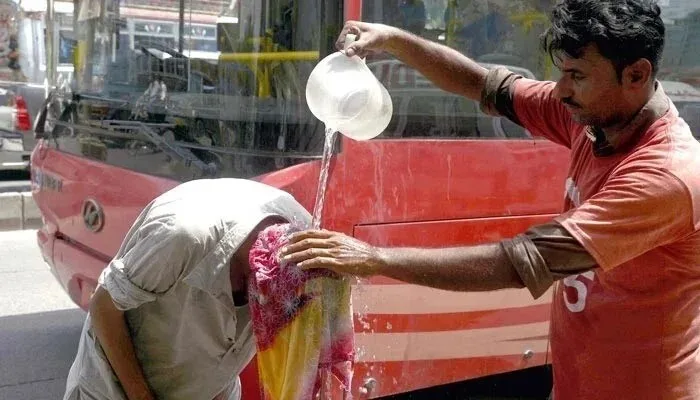A severe Sindh heatwave has gripped large parts of the province, with the Pakistan Meteorological Department (PMD) warning that temperatures could rise 5 to 7 degrees Celsius above average today. The extreme heat is expected to affect several districts, placing millions at risk as the region braces for sweltering days ahead.
Scorching Conditions Across Upper Sindh
According to PMD, areas in upper Sindh — including Larkana, Jacobabad, Shikarpur, Kashmore, Qambar Shahdadkot, Ghotki, and Sukkur — are likely to experience exceptionally high temperatures. The heatwave has tightened its hold, with little to no relief expected in these regions over the next few days.
Karachi Braces for Hot, Humid Days
In Karachi, residents can expect hot and humid weather on Tuesday and Wednesday. The PMD forecasts maximum temperatures between 36°C and 38°C. Although the sea breeze may resume intermittently, its cooling effect will likely be brief and limited.
On Sunday, temperatures in Karachi soared to nearly 40°C, setting the stage for an unrelenting week. Despite being a coastal city, Karachi’s vulnerability to the urban heat island effect — where densely built areas trap heat — amplifies discomfort during such weather patterns.
Read: PTI Power Struggle Deepens as Azam Swati Backs KP CM Gandapur
Wind Gusts for Coastal Areas
Coastal districts including Thatta, Sujawal, Badin, Mirpurkhas, Umerkot, and Tharparkar are expected to experience strong, gusty winds. However, these winds may do little to cool the region and could instead increase the risk of dust storms and reduced air quality in some places.
Experts Link Heat Surge to Climate Change
Chief Meteorologist Muhammad Afzal has pointed to climate change as a key driver behind this temperature surge. He noted that Pakistan is witnessing a steady rise in average temperatures nationwide, with urban centers like Karachi bearing the brunt.
“Much of the country may see temperatures 2°C to 3°C above normal, with Karachi experiencing spikes of up to 4°C beyond its seasonal average,” Afzal said.
He emphasized that rapid urbanization, lack of green spaces, and poor infrastructure contribute to higher retained heat, especially in major cities.
Public Advised to Take Precautions
The PMD has urged the public to adopt preventive measures during this heatwave. Key recommendations include:
-
Staying indoors during peak sunlight hours (11 a.m. to 4 p.m.)
-
Drinking plenty of water to avoid dehydration
-
Wearing light, breathable clothing
-
Conserving water usage to reduce strain on municipal systems
Authorities are also advising schools, workplaces, and community centers to create shaded, ventilated areas for public safety.
With climate patterns shifting, Pakistan is expected to face more frequent and intense heatwaves in the years ahead. This event may serve as a harsh reminder of the urgent need for better urban planning, environmental protection, and public awareness in the face of rising global temperatures.
Follow us on Google News, Instagram, YouTube, Facebook,Whats App, and TikTok for latest updates
